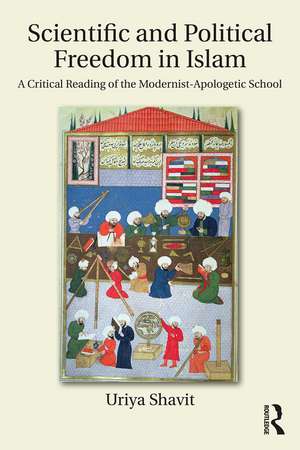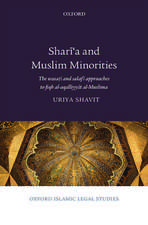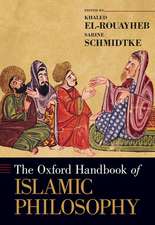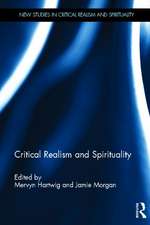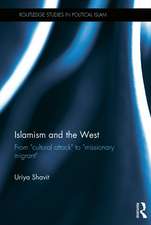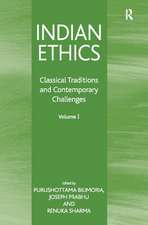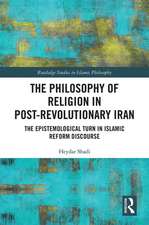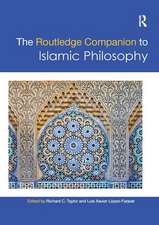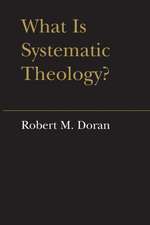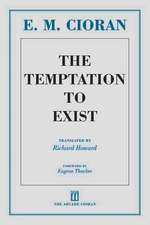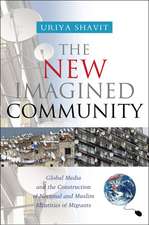Scientific and Political Freedom in Islam: A Critical Reading of the Modernist-Apologetic School
Autor Uriya Shaviten Limba Engleză Paperback – 28 feb 2017
‘Scientific and Political Freedom in Islam’ critically examines the coherence and consistency of modernist-apologetic scholars. This is done through a discussion of their general theorizing on reason and freedom, which is then followed by discussions of their commentaries on specific scientific and political issues in light of their general theorizing. Regarding the former, the focus is Darwin’s theory of evolution, while the universality of the "Biblical flood," the heliocentric model, the Big Bang model and Freudianism are also discussed. Regarding the latter, the focus is Islam’s desired structure of government and concept of participatory politics, while individual freedoms are also discussed. The book argues that the modernist-apologetic approach has great potential to be a force for liberalization, but also possesses inherent limitations that render its theory on the relation between revelation and freedom self-contradictory.
Introducing a significant body of new information on the reasons for the failure of secularism and democracy and the attitudes towards Darwinism in the Arab world, this book is a valuable resource for students and scholars of Islamic Studies, comparative religion, democracy studies and evolution studies.
| Toate formatele și edițiile | Preț | Express |
|---|---|---|
| Paperback (1) | 479.63 lei 6-8 săpt. | |
| Taylor & Francis – 28 feb 2017 | 479.63 lei 6-8 săpt. | |
| Hardback (1) | 764.20 lei 6-8 săpt. | |
| Taylor & Francis – 8 mar 2017 | 764.20 lei 6-8 săpt. |
Preț: 479.63 lei
Nou
Puncte Express: 719
Preț estimativ în valută:
91.78€ • 96.07$ • 76.39£
91.78€ • 96.07$ • 76.39£
Carte tipărită la comandă
Livrare economică 31 martie-14 aprilie
Preluare comenzi: 021 569.72.76
Specificații
ISBN-13: 9781138286047
ISBN-10: 1138286044
Pagini: 200
Dimensiuni: 156 x 234 x 11 mm
Greutate: 0.23 kg
Ediția:1
Editura: Taylor & Francis
Colecția Routledge
Locul publicării:Oxford, United Kingdom
ISBN-10: 1138286044
Pagini: 200
Dimensiuni: 156 x 234 x 11 mm
Greutate: 0.23 kg
Ediția:1
Editura: Taylor & Francis
Colecția Routledge
Locul publicării:Oxford, United Kingdom
Public țintă
Postgraduate and UndergraduateCuprins
Introduction 1 A Quest for Reason and Freedom 2 Islam and Science 3 Islam and Democracy Conclusion
Notă biografică
Uriya Shavit is Associate Professor of Islamic studies and Head of the Graduate Program in Religious Studies at Tel Aviv University. His main research interests lie in the study of modern Islamic theology, law and politics and the sociology of Muslim minorities in the West. His most recent books are Islamism and the West, Shari‘a and Muslim Minorities and Zionism in Arab Discourses.
Recenzii
"Highly recommended reading not only for scholars and students interested in the history of modern Islamic ideas but to anybody who cares about the proper relationship between religious faith, science and politics in the Islamic world today." Professor Torkel Brekke, author of Fundamentalism: Prophecy and Protest in an Age of Globalization (2012)
"Uriya Shavit shows with great erudition that the modernist-apologists are not a thing of the past. The discourse of ʿAbduh and Rida still inspires Arab Muslim scholars and intellectuals to formulate alternatives to both secularism and intransigent Islamism." Professor Martin Riexinger, Aarhus Universitet, Denmark
"Uriya Shavit shows with great erudition that the modernist-apologists are not a thing of the past. The discourse of ʿAbduh and Rida still inspires Arab Muslim scholars and intellectuals to formulate alternatives to both secularism and intransigent Islamism." Professor Martin Riexinger, Aarhus Universitet, Denmark
Descriere
This book critically explores the modernist-apologetic Islamic approach to the relation between revelation and science and politics which, for over a century, has been a central part of Arab discourses on the future of Muslim societies. The main thesis of the book is that the modernist-apologetic approach has great potential to be a force for liberalization, but also possesses inherent limitations that render its theory on the relation between revelation and freedom self-contradictory.
